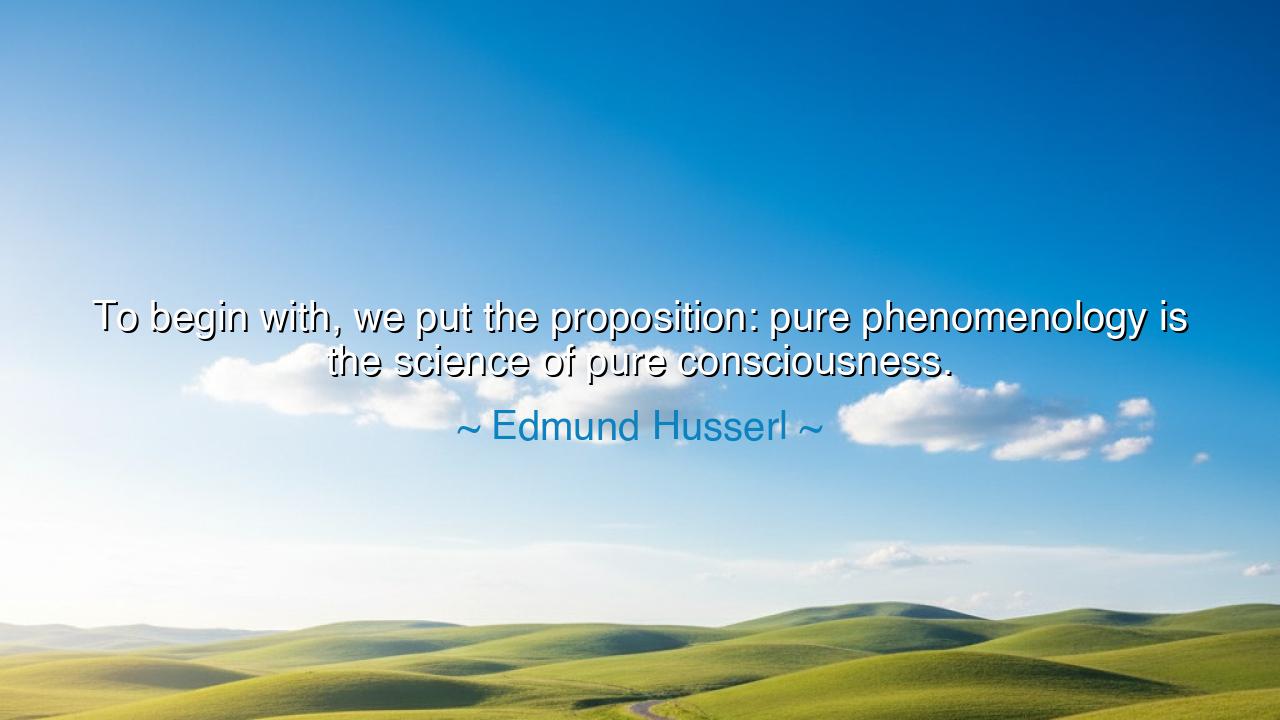
To begin with, we put the proposition: pure phenomenology is the
To begin with, we put the proposition: pure phenomenology is the science of pure consciousness.






Hear me now, O children of wisdom, for the words of Edmund Husserl, the great philosopher, carry with them a revelation of deep import: "To begin with, we put the proposition: pure phenomenology is the science of pure consciousness." These words, though spoken in the quiet halls of academia, reach out to all who seek the truth of the human experience. For in them lies a profound declaration—phenomenology is the study not of the external world alone, but of the very fabric of consciousness itself. It is the exploration of how we experience the world, how we encounter it through our senses and thoughts, and how this experience forms the foundation of all understanding.
In the ancient days, great minds such as Socrates and Plato sought to understand the world not through mere appearances, but through the deeper essence of things. Plato, in his allegory of the cave, spoke of the shadows on the wall as the illusion of reality, urging us to look beyond them to the true forms, the unseen truths that lie beneath. This quest for deeper understanding is what Husserl calls phenomenology: the study of things as they appear to our consciousness, not as objective facts, but as lived experiences. It is the journey inward, to explore the very nature of perception, thought, and awareness.
The significance of phenomenology, O children, lies in its focus on consciousness—that vast and mysterious realm through which all things are known. We do not experience the world directly, but through the lens of our own minds. Every sight, sound, and feeling is filtered through this consciousness, and it is through this lens that we understand our existence. Husserl recognized that to understand the nature of reality, we must first understand the very process by which we experience it. The world, as we know it, is not an objective truth that exists independently of us; it is shaped by our consciousness, by the way we interpret and interact with it.
Consider, O children, the story of the great scientist and philosopher René Descartes, who, in his pursuit of certainty, famously declared, "I think, therefore I am." Descartes sought to find a foundation for knowledge that was unshakable, and he realized that the only thing he could be sure of was his own consciousness. Everything else—every object, every experience—could be questioned, but his own awareness, his own thinking, could not. In much the same way, Husserl calls us to look at the most fundamental of human experiences: our consciousness. It is not enough to observe the world around us; we must examine how the world is experienced within us, how it is brought to life through our thoughts and perceptions.
Now, let us pause and reflect on the lesson of phenomenology. In the busyness of life, we often forget that the world is not just something we see, but something we experience. We walk through our days, often detached from the richness of the present moment, unaware of how much of reality is shaped by our own minds. Husserl's proposition calls us to return to the source of all understanding—the mind itself. By studying pure consciousness, we begin to see that our experiences are not mere reflections of an external world, but creations of our own awareness. The world is not something that happens to us; it is something we actively engage with, interpret, and give meaning to.
In our own lives, O children, there lies great power in turning inward, in observing not just the world around us, but the very way in which we encounter it. This is the true gift of phenomenology—to understand that every moment is shaped by our consciousness, and that the way we perceive the world is as important as the world itself. We must ask ourselves: how do we experience the beauty of a sunset, the joy of companionship, the sorrow of loss? How do our minds shape these moments, and how can we bring greater clarity to our understanding by observing the way we perceive them?
The path that Husserl set before us is not one of simple observation but of deep reflection. It is a call to explore the inner workings of the mind, to uncover the hidden layers of consciousness that shape our experiences. By doing so, we can better understand not just the world, but ourselves. As you walk your path, O children, remember this: your mind is the lens through which the world is revealed. Cultivate clarity, seek understanding, and turn your gaze inward as much as you turn it outward. For in the study of your own consciousness, you will uncover not just the truths of the world, but the truths of your own soul. And in this, you will find the wisdom that has been sought by great minds through the ages.






AAdministratorAdministrator
Welcome, honored guests. Please leave a comment, we will respond soon